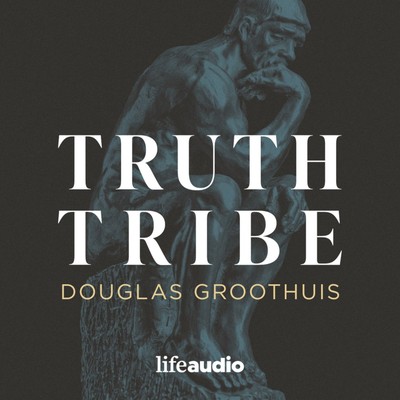
Truth Tribe with Douglas Groothuis
Douglas GroothuisThe Enneagram and a Heretic’s Christ
July 8, 2024 ● 38 minShare this episode
In this episode, Dr. Doug Groothuis delves into the teachings of Richard Rohr, a key figure in the Enneagram movement. Dr. Grothuis, an experienced Christian apologist, explores Rohr's worldview and theology to determine if they align with historical biblical Christianity. Listeners are taken on a journey to understand whether Rohr's beliefs about reality and biblical truth reflect the Christ of the Bible or a distorted version. Dr. Grothuis draws from his background in discernment, offering insights into the potential pitfalls of following teachings that may not be in line with traditional Christian doctrines.
Testing the spirits and discerning false teachings is crucial in maintaining a solid foundation in biblical truth. As discussed in the podcast episode, the Apostle John in 1 John 4:1-4 warns believers not to believe every spirit but to test them to see if they are from God. This caution is essential because there are many false prophets and teachings in the world.
The episode emphasizes the importance of comparing teachings to the truths found in the Bible. It highlights the need to have a deep knowledge of scripture to discern false teachings effectively. The transcript mentions various biblical passages that warn about false prophets, false apostles, and deceitful workers who may masquerade as messengers of Christ. By testing teachings against the Word of God, believers can identify discrepancies and falsehoods.
Furthermore, the episode stresses the significance of understanding the true doctrine of God, Christ, and salvation to recognize counterfeit teachings. By knowing the authentic biblical teachings, individuals can easily spot false doctrines that deviate from Christianity's core beliefs.
Richard Rohr's worldview and theology significantly deviate from historical biblical Christianity. One of the key deviations is Rohr's denial of the fundamental doctrine of the creator-creation distinction. In historical biblical Christianity, there is a clear metaphysical distinction between the eternal, self-existent Creator and the finite creation. However, Rohr, influenced by pantheistic or panentheistic beliefs, blurs this distinction by suggesting that everything is divine or that the world itself is divine. This denial of the creator-creation distinction undermines the core biblical understanding of God as the sovereign Creator distinct from His creation.
Furthermore, Richard Rohr's teachings also challenge the essential doctrine of atonement through Christ. In traditional biblical Christianity, the death of Jesus Christ on the cross is central to the redemption and reconciliation of humanity with God. Christ's sacrificial death is understood as the atoning sacrifice for human sin, demonstrating God's love and justice. However, Rohr's theology dismisses the significance of Christ's death as a necessary act to rectify the problem of human sin. He downplays the concept of Christ's death as a substitutionary sacrifice required by God's offended justice, which is a core tenet of historical biblical Christianity.
Rohr's teachings also distort the understanding of Jesus Christ himself. He misinterprets biblical passages, such as John 14:6, where Jesus unequivocally states, "I am the way, the truth, and the life. No one comes to the Father except through me." Rohr attempts to reinterpret this to fit his universalist perspective, suggesting that it refers to a universal essence rather than the person of Jesus Christ. This misinterpretation undermines the unique role of Jesus as the only way to salvation, as emphasized in traditional Christian doctrine.
In conclusion, Richard Rohr's theology presents a distorted version of historical biblical Christianity by denying key doctrines such as the creator-creation distinction and the atonement through Christ. His teachings reflect a syncretistic approach that blends elements of various non-Christian worldviews with Christian terminology, leading to a departure from the core beliefs and teachings of traditional Christianity.
To combat false teachings like those of Richard Rohr, it is crucial to have a strong foundation in biblical knowledge, active participation in a Bible-believing church, and reliance on the Holy Spirit for discernment. Dr. Doug Groteis emphasizes the importance of knowing and studying the Bible to discern false teachings. He highlights the need to be familiar with the Scriptures to recognize when teachings deviate from biblical truths. By understanding the true doctrine of God, Christ, and salvation, individuals can spot counterfeit teachings that distort these foundational beliefs.
For more on Rohr, see Douglas Groothuis, “A Heretic’s Christ, a False Salvation,” Christian Research Journal at equip.org.
Discover more Christian podcasts at lifeaudio.com and inquire about advertising opportunities at
Today's Devotional
A Reflection Prayer for Holy Monday - Your Daily Prayer - April 14
As we enter Holy Week, let us set aside the next few days to truly reflect on the life, passion, and ultimate sacrifice that Jesus made for us on the cross.
Top Artists
Top Music Videos

Passion Music Passion Powerful ‘He Who is to Come' Live Performance

chris rupp Soul-Stirring Chris Rupp A Cappella ‘I Will Rise’ Cover

Mac Powell Lyric Video For Mac Powell's Moving 'The 99'

Tauren Wells Tauren Wells’ Soul-Stirring ‘Thank You for The Cross’

Passion Music 'The Lord Will Provide' Passion And Landon Wolfe Live Performance










